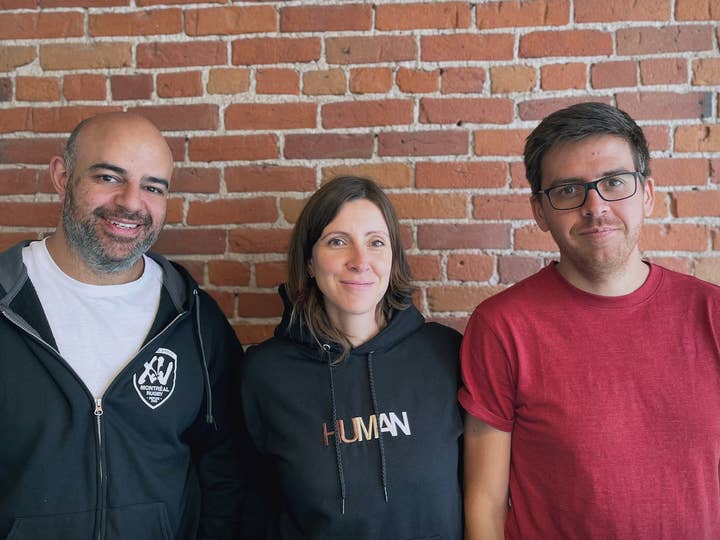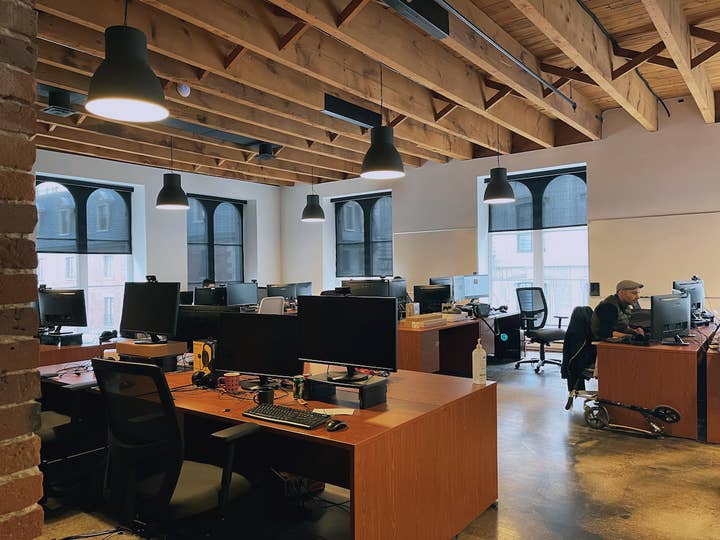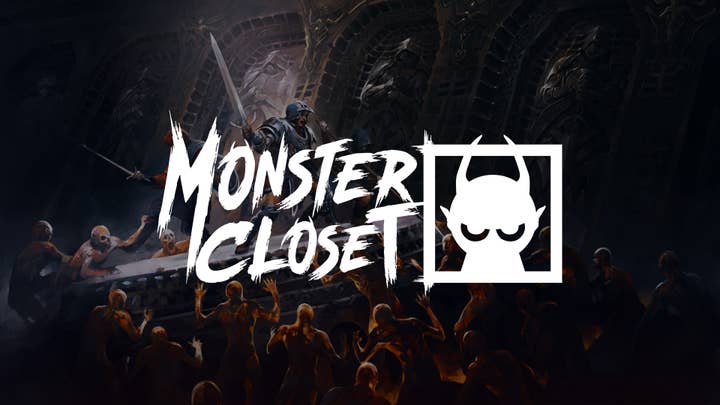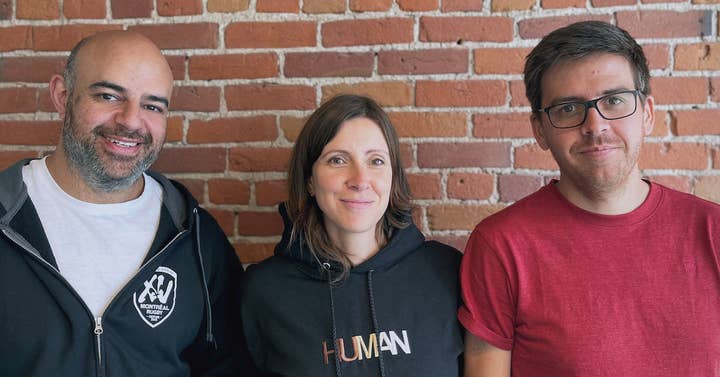What to consider when making the leap from AAA to indie
The Monster Closet team shares advice about the realities of creating your company, even when coming from an experienced AAA background
It feels like there is news of former AAA developers launching their own studio almost every week these days.
Looking at the past six months only, there was former Call of Duty devs Deviation Games in June, Naughty Dog and Infinity War alumni That's No Moon in July, former Typhoon Studios staff Raccoon Logic in August, Brendan Greene launching PlayerUnknown Productions in September, ArenaNet and Ubisoft veterans creating Possibility Space in October.
But Raccoon Logic wasn't alone in August, as the month saw the launch of another Montreal-based studio with a AAA background: Monster Closet, formed by Ubisoft alumni with decades of experience.
GamesIndustry.biz talked to CEO Graeme Jennings at the time, discussing his team's desire to go indie, and the general AAA brain drain.
But despite this trend, leaving the comfort and benefits of a AAA studio to go it alone is not an easy path. And that's something Jennings was keen to discuss in more detail with the GamesIndustry.biz Academy, providing guidance for experienced developers who might be tempted by the adventure.
"There's no magic parachute where we are now, no one's going to come in and save the day"Graeme Jennings
"We ran large projects for a long time, but it was always within an organisation that offered a structure for even basic things like benefits, healthcare, payroll, how to plan holidays, all of these things," he says. "And suddenly there's no structure for those things, there's no base structure for even the IT policy. So you find yourself with a bunch of additional things that you need to do that no one owns except your small group. And that's really a big difference.
"When you're coming from AAA and a monster studio like the other one in Montreal here, you can get resources if you're in trouble. There's no magic parachute where we are now, no one's going to come in and save the day. You have to be very conscious over scope, what you want to do, make sure you understand that everyone's clear on where you're going and how you want to do it."
Monster Closet started in March 2021, with the five co-founders gathering in a meeting room with a whiteboard, trying to figure out what exactly was going to happen.
"It was as low level as that," Jennings recalls. "We looked at the pillars that needed to be put together to make the studio functional, from IT to finding an office, from policies on recruitment, from game targets [to] where we wanted to go next."
To save yourself hours staring at a similar whiteboard, the Monster Closet team offered advice to anyone making the leap from AAA to indie.

Before your start: the importance of the prep work
- The vision
The No.1 priority when you want to launch your own studio is to be clear about what it is you're trying to achieve. This will impact how you hire, how you get funded, how you grow, and more.
"Once you have the idea that you're going to build a studio, you need to understand and decide what the purpose of that studio is," Jennings says. "For us, the goal was to build a studio that's fun, that's a great place to work, that makes great games, but also for the future. This is our home for ten, 15, 20 years if we do well; that's the goal.
"So when we structured how we wanted to find investment, that was structured against those targets: the fact we could be autonomous in terms of creativity and decisions, and then we took an equity amount that allowed us to see out that vision.
"You need to think about what you want from that studio, in a year, in three years, in five years, in ten years and then structure even the initial business deal around that"Graeme Jennings
"[Different] people build studios for different reasons. Some people build studios with a goal to be acquired, in which case you may do more of a flashy demo and then staff up as quickly as possible with the hope that you'll be acquired, and you're making money that way."
For Monster Closet, the priority was to build for its future and have creative and cultural control, so early funding decisions were made against that goal.
"As we talked to different investors we discussed what our targets were until we could find one that really matched what our needs are," Jennings continues. "At the highest level, you need to think about what you want from that studio, in a year, in three years, in five years, in ten years and then structure even the initial business deal around that."
Alongside that process comes a number of things that need to be put in place, such as how decisions are made and how shareholders are chosen -- all of it being a big change from being "a producer on the floor," Jennings says, having worked as a producer his whole career.
- Find partners who can help you understand the legalese
Launching a studio involves a lot of tasks that are unrelated to what you generally do as a developer, he continues, including a lot of legal and administrative aspects to understand.
"You need a good lawyer or business partner to understand those things because it's both understanding it from a business perspective, but also understanding the laws within the country that you're working with," he says. "Québec has certain laws relating to business for how companies are formed, how decisions are made, and so on. So you really need good guidance on that.
"The complexity of setting up a company from a legal point of view -- especially when there's investors involved -- is not just 'you take these shares and we're good', and it's one piece of paper. It's 15 documents, some of which are 30 pages long, and you're reviewing them, and sometimes you don't understand all of the content. I understand it now, but when I started I didn't understand it all."
"There's a lot of bits that aren't really mapped out anywhere that you need to try and find your way through"Graeme Jennings
Practical considerations around payrolls, tax numbers and other administrative aspects were a big lesson to learn for Monster Closet, as they all involve doing research if you're not familiar with the process. Jennings recalls many, many phone calls with Revenue Québec to try and figure it out.
"There's a lot of bits that aren't really mapped out anywhere that you need to try and find your way through from a practicality of running a business point of view," he adds.
"If you don't really understand what you want to do with the company, and you're really not clear on the business terms, and you really don't understand the legal part, I think you could end up with something you absolutely didn't want.
"The time that takes is significantly longer than you expect it to be. So if we go for it again in the future and we build Monster Closet 2, then I will buffer out a significantly longer time: 'Here's when we're going to start and here's when I think we're actually going to start', because it's months and months of time."
- Securing an office
Jennings says it was important for the team to get an office because they "wanted a place that [they] could call home" and work together. It's particularly crucial in the early days of a studio as you're trying to build a company culture, he adds.
"Negotiating the office takes X amount of time with agents, and you're discussing things on office size and cost per foot that you've never discussed before. So there's a lot of business operation things that I think are very different from what would be a day-to-day senior producer exec job."
When thinking about securing an office space, you need to make sure that the space fits the vision you have for company growth.
"The base level thing is we took a space that is significantly larger than the space we need right now," Jennings says. "We managed to get two different suites in old Montreal, and we're going to knock them together. So we're good for the vision we have for the company versus the size and space we have. We already spaced people generously, so even for our projections we fit very easily.
"I don't quite know how this scales across other [countries], but office prices are at a premium, it's a buyer's market just now. A lot of companies have scaled up office space and then said: you never need to come back to the office. So there's a lot of space that's empty, a lot of bargains to be had."

- Setting up your IT infrastructure
Once you've sorted out your objectives and have a clear understanding of the admin and legal aspects, the prep work is not over. What hardware and software do you want to provide your staff with? What email provider are you getting? Are you aware of online security policies that might be needed?
"Building a studio and building games it's not the same thing, especially on the tech side," says Monster Closet's technical director Thomas Félix. "You have to choose wisely what you're going to invest [in] and what you're going to do first.
"At first you don't even have emails and ways to communicate," he laughs. "So it's far away from starting a big project with 200 programmers already working on an engine they know. We needed the studio to get going, but at the same time we had people who also wanted to start to prototype."
"Building a studio and building games it's not the same thing, especially on the tech side"Thomas Félix
Félix highlights the importance of prioritising things on the tech side, and how that's a completely different set of challenges than building a game within a big company.
"We started to draw a roadmap of where we wanted to go and within the first few months we said: as soon as possible we need to almost forget about the game," he continues. "Let's make sure that we have a way to communicate, we have people that can send email, chat, and things like that. That was the very first thing we did."
Then comes the engine. Monster Closet is using Unreal, Epic Games' engine, which you can read more about in this GamesIndustry.biz Academy guide if you're unfamiliar with what it offers. It's a choice Félix recommends because it means developers can hit the ground running fast, and without any hand holding.
"Being a tech person, the first thing you'd like to say to the developers is: let's dive into the engine and look at what we're going to do with it," he says. "And at least having Unreal, [we could say]: you know what, for a few weeks, you guys can ramp up on it, you don't need us -- Epic provides a good toolset off the shelf when you just want to prototype, and on our side we're going to start to set up the company and the infrastructure. So that was a good choice because this way people were able to prototype without the need for programmers, and on our side we dived right into IT.
"Something that we probably approached differently than in the past is you don't necessarily always look for the best solution, the best feature set possible. You're also looking into what you can get quickly with the least support and the least [cost] possible. So that was key for us.
"We looked into what the different technology providers offered to us in terms of emails, chat organisations, security policies -- which are super important -- and sometimes you decide to go with something that's going to do 85% of the job right, but it's good enough. And potentially you go back to it later -- you start to prioritise like that, you don't necessarily need to get everything right in the first few weeks, you need to get people up and running and then you build layers on top of that."
It's worth mentioning that Monster Closet didn't hire any IT specialists to help them set up, it was all done in-house by the founders. Creating your company means that you end up doing tasks that you don't always want to do so the studio can run.
"In the long run, you don't need an IT team that's just going to do IT - that could be almost useless"Thomas Félix
"I don't have a PhD in IT security," Félix says. "So you just need to be patient basically. It takes a long time, it's been more than six months now, and we're starting to be out of the wood with a few people working on it actively.
"And then there's all the little things that you have to do like timesheets. You need to have a timesheet system. So I built the timesheet manager, and it's not something I ever planned to do in my career you know," he laughs. "But it's fun at the same time. Since we are wearing multiple hats, it's difficult sometimes to go from debugging a timesheet manager to having a call to discuss long-term strategy, or roadmap for tech. You have to be able to do both at the same time."
It's useful if the first few developers joining your team are tech-savvy, Félix continues.
"Or at least [know] what IT means, what it requires to build a decent engine pipeline, anything like that. In the long run, you don't need an IT team that's just going to do IT -- that could be almost useless. You actually want people to be able to own their feature from the beginning until the end including deploying it, running it in the cloud, and things like that.
"That was important to us and I think that's why we've managed to be successful so far. The first few people you hire need to have this skillset or be willing to learn that."

Creating the right culture
Building your own studio is not just finding an office space and making sure you have an internet provider, it's making sure that you're creating a culture for your employees that is healthy, inclusive and welcoming.
"The guys who were there from the start had a mindset [of] good intentions so the culture has already been something that's positive, but the challenge is when you welcome new people aboard, how do you make sure that this is maintained?," says producer Marie-Josée Ouellet. "For us, the effort has really been put on the recruiting part."
When hiring new staff past the initial founding stage, you need to take the time and effort to make sure they will have the same values as you. At Monster Closet, potential new recruits meet the team as part of the interviewing process, for instance.
"We also want to make sure that they know enough about us, about the company that they're joining, to be able to tell if it's a fit for them," Ouellet continues. "We don't want them to join us and then realise later that maybe that's not in line with what [they were] looking for. So we need to make sure that we really are thorough and we present everything, present everyone.
"And we want everyone in the team also to meet them so that they know who's coming in and they are on board with that decision. Then it becomes a shared responsibility."
"Everyone's an owner of the company we have, the culture we have, the [atmosphere] of the studio"Marie-Josée Ouellet
She highlights the importance of having everyone vouching for new recruits, instead of that responsibility being in the hands of a happy few like it's typically the case at AAA studios.
"Everyone's responsible to welcome them aboard, help them find their space, help them become a part of the team. Sharing that responsibility makes a big difference. Everyone's an owner of the company we have, the culture we have, the [atmosphere] of the studio. It's everyone's job, so if you're not happy with something, bring it up, change it, bring solutions. You're part of it, you're in charge of it as much as everyone else."
Talking about recruitment, Jennings recommends hiring people who have experience being indie early on in the process. At Monster Closet, no one actually had experience outside of big studios.
"The core group had come from AAA, we quickly wanted to get someone who had worked in an indie studio before, to help us, to make sure the culture is aligned, to have the experience of being in a small studio, to make sure we're not crazy on things trying to do," he says.
"I think that's important because you need to not try and rebuild what you had before on a smaller scale, you need to really build it in a way that makes sense for the vision."
Make sure you hire someone to handle production early on as well, even if your personal experience is being a producer, like Jennings. Running the studio means you probably won't be able to do your actual job in the same way you used to.
Ouellet points to the importance of everyone in the team being a jack of all trades.
"It's important that the people that you get on board don't stick to one thing and say 'I'm an expert'. It's a joint venture, everyone needs to be hands on -- Thomas was saying a thing about the timesheet and it's true for everyone. Everyone needs to take on topics that are not necessarily the thing that they dreamt to do but it's important, and they need to get to it.
"We can't sit down and discuss at length everything that we do, sometimes it's like: okay, I'll do a first version, let's get to it, and you need to act and take that momentum and make sure that people are really driving everything forward. You cannot afford to have people sitting on the bench and waiting to be told what to do."

Keeping your priorities and scope in check
One challenge that will emerge early on when creating your own studio, and that will persist for a long time, is managing to keep your priorities in check. Working as an indie after years in AAA requires a shift in mindset that isn't easy.
When it comes to scalability, Félix notes that, having previously experienced big pipelines at AAA studios,the team at least knows what to expect on that end. But the key is to remain realistic as you won't have the same resources this time around.
"We've seen how to run a game with 1,000 people over ten countries at the same time, so at least we know how we can make things scale. The big pitfall to try to avoid is we're not building a big game like that again, so we don't have the same needs. How do you use your knowledge to know where to invest without going crazy and trying to just reproduce what you've been doing for the last 20 years? I think it's important.
"The cloud is very useful when it comes to scalability because we started with just a few machines in the cloud and now, as we grow, we just grow the numbers of machines and as long as you monitor your cost, you're pretty much good to go."
Ouellet adds that instincts will sometimes tell you to just get going and build the bases of everything. The problem is there's no other team helping on other aspects while you're focusing on something, and no one else to run the studio while you're busy elsewhere.
"It's really [about] where to stop yourself from doing something that would make the [game] experience more comfortable and say: it's fine, let's keep it like that, let's move on to something [else]," she continues. "What's the minimum we need to get the answers that we need and really get working on the things that truly are going to define what the game is? Because having generic stuff, even if we know how to do it and it's going fast, it's not the thing that's going to unblock us going forward and make us ready for production.
"If no one's working on something, it doesn't exist. It helps us focus on what matters"Thomas Félix
"Because we all come from big studios, we're used to doing something and then in parallel there's people working on every topic and everything comes together at some point. But now it's really: okay, let's take a step back. Yes, it would make sense to just finish it because you've started it, but no, it's not intuitive. It's hard sometimes because you just want to see the end of it and you're absorbed into it. But [you need] to say: hey guys, we know enough about this now and even if it's not perfect let's put it aside, and let's start to dig into a new topic completely, and get going on this."
Félix adds: "There's something that we started saying almost as a joke when we started, but became almost a pillar: if no one's working on something, it doesn't exist. It helps us focus on what matters."
Jennings says you have to be honest with yourself -- and as a group -- and make sure you nurture open discussions within the team to make sure everyone's on the same page.
"You have to understand what your scope is versus your capabilities, and what you think you can and can't do. There's no point in having flashy demos that look good if you can't actually build it."
Félix points out that this mindset applies to technology too, and that you need to stay humble, especially when coming from big AAA studios.
"We have to accept and embrace the fact that that's not who we're going to be -- at least not for a long time. Scope your game accordingly, don't believe you're going to build the next, online open world game in Unreal with ten people, it's not true. Even if you come from big AAAs and you did it before, it's just not true."
Ouellet points back to Jennings mentioning that they're building Monster Closet to last, and adds that, while they're building a game, they're also building a team.
"Don't believe you're going to build the next, online open world game in Unreal with ten people, it's not true. Even if you come from big AAAs and you did it before, it's just not true"Thomas Félix
"At some point, this game will ship but the team will stay, so keeping the scope in check has an impact on that as well," she says. "We don't want to overwork our people, we need to be strategic in how we are going to produce this so that it makes sense, so that we are able to ship it at the quality that we want, but also so that our people are happy. It's a lot of strategic planning to make sure we're shipping the games and the working conditions are [good] as well."
Concluding our discussion, Félix says going from AAA to creating your own studio means relearning everything, and being ready to challenge everything you know.
Most of the Monster Closet team works on tasks they've never done before, so everyone is still in a learning phase.
"Culturally we're learning together, and we're supporting each other as we go," Jennings says. "We're not in a position where there's a group of people who mastered a thing and then there's new people that don't understand that.
"Everyone's in a learning phase, which really helps people push together to support each other and that's worked pretty well because a lot of the time we're like, 'how do we do this' and we don't know, but we're going to go and find out together how to do it. That's very positive as a driving force as a group to try and achieve a goal."
More GamesIndustry.biz Academy guides to Working in Games
Our guides to working in games cover various perspectives, from hiring to retention, to landing the job of your dream or creating the right company culture:

